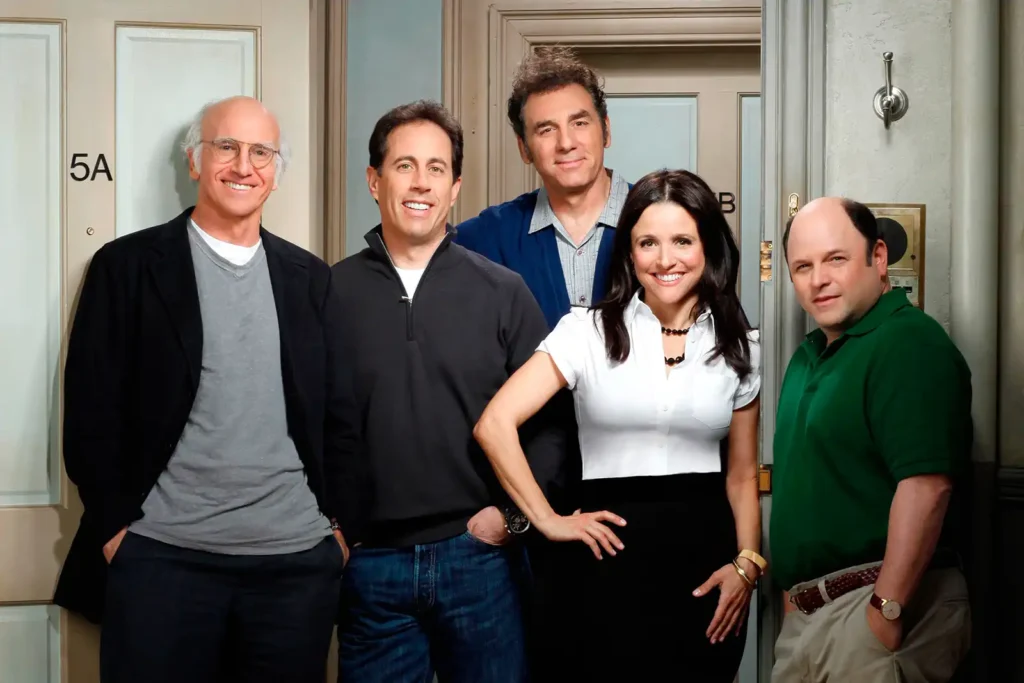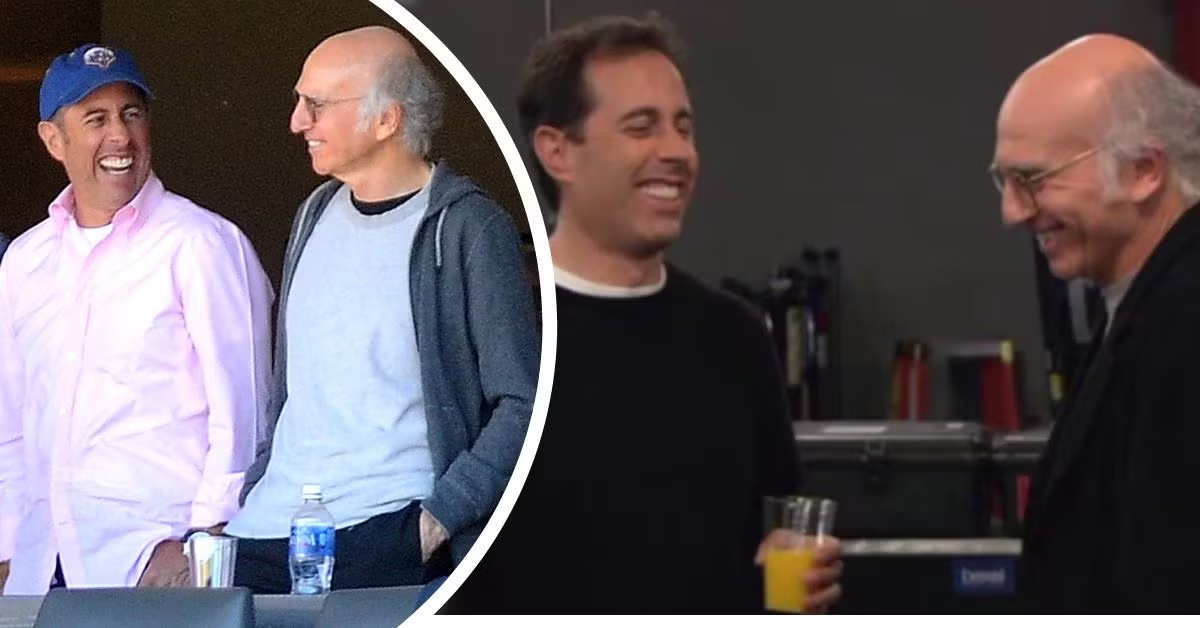Larry David, co-creator of Seinfeld and the comedic mind behind Curb Your Enthusiasm, is often considered one of the most influential figures in television comedy. His distinctive style—marked by neurotic, awkward, and self-deprecating humor—has become iconic in the world of sitcoms. Much of David’s signature comedy was shaped during his time working on Seinfeld, a show that revolutionized television and established itself as a cultural phenomenon. In this article, we will explore Larry David’s journey from stand-up comedy to creating Seinfeld, the lasting impact of the show on his humor, and how his Seinfeld legacy continues to influence the comedy landscape.
Larry David’s Early Career and Comedy Beginnings
Before Seinfeld became the juggernaut of 90s television, Larry David was honing his comedic craft as a stand-up comedian in New York City. Born in Brooklyn in 1947, David’s early life played a significant role in shaping his comedic outlook. Raised in a middle-class Jewish family, his humor often drew from the awkwardness and neuroses of everyday life—traits that would become key elements of his comedic persona.
In the 1970s and early 1980s, David worked as a stand-up comedian, performing in various clubs across New York City. His style, however, was unconventional for the time. Rather than punchlines or traditional setups, David’s comedy focused on the minutiae of life’s daily frustrations, often presented in a self-deprecating manner. His humor was rooted in the absurdity of social conventions and personal anxieties, which didn’t always resonate with mainstream audiences initially. He struggled to gain traction as a stand-up comedian but never lost his commitment to his unique comedic voice.
David’s early career also included a stint as a writer for Saturday Night Live (SNL) from 1984 to 1985, though his time on the show was famously short-lived. Only one of his sketches aired during his tenure, a testament to his unconventional style that didn’t always align with the show’s format. Despite these setbacks, his experience at SNL and his time performing stand-up comedy laid the groundwork for what would become his most significant achievement—Seinfeld.
The Creation of Seinfeld: Where Larry David’s Humor Found Its Voice
The turning point in Larry David’s career came when he was introduced to comedian Jerry Seinfeld. The two quickly became friends, sharing a similar comedic sensibility, and together they would go on to create Seinfeld—a show that would redefine the sitcom genre. Premiering in 1989, Seinfeld initially struggled to find an audience, but it eventually grew into a cultural powerhouse, running for nine seasons and becoming one of the most critically acclaimed and commercially successful sitcoms in television history.
Seinfeld was often described as “a show about nothing,” but in reality, it was a show about the small, mundane moments of life that most sitcoms ignored. This was where Larry David’s comedic brilliance shone through. He brought his stand-up sensibilities to the writing of Seinfeld, infusing the show with his characteristic humor, which focused on the absurdity of social interactions, minor inconveniences, and personal idiosyncrasies. Whether it was George Costanza’s constant scheming, Jerry’s obsession with minor details, or Kramer’s eccentric antics, much of the humor in Seinfeld stemmed from David’s deep-seated understanding of human nature and its often ridiculous complexities.
David’s character on the show, though never appearing on screen, was most clearly reflected in George Costanza, played by Jason Alexander. George was neurotic, selfish, and perpetually dissatisfied—a clear reflection of David’s own anxieties and frustrations with everyday life. The character quickly became one of the most beloved in television history, thanks to David’s sharp writing and his ability to find humor in the most awkward and uncomfortable situations.

The Seinfeld Legacy: Redefining Sitcoms and Influencing Future Comedy
Seinfeld was revolutionary in many ways, and Larry David’s influence on the show’s success cannot be overstated. While many sitcoms of the time followed a traditional format—focused on family dynamics or work-life scenarios—Seinfeld broke new ground by eschewing sentimentalism in favor of observational, often cynical humor. The show’s “no hugging, no learning” mantra, coined by David, set it apart from other sitcoms that leaned heavily into emotional or moral resolutions. Instead, Seinfeld thrived on characters who remained flawed and unchanging, no matter what situations they found themselves in.
One of the key elements of David’s humor that shone through in Seinfeld was the way the show highlighted the trivialities of modern life. Episodes would revolve around topics as seemingly insignificant as waiting for a table at a Chinese restaurant, miscommunicating on a phone call, or breaking up with someone over a minor quirk. Yet, these mundane scenarios were transformed into comedic gold through David’s clever writing and the ensemble cast’s performances.
Seinfeld also challenged the traditional notion of likable characters. None of the main characters—Jerry, George, Elaine, or Kramer—were particularly virtuous or kind-hearted, yet audiences loved them because they were relatable in their flaws. This subversion of sitcom conventions became a hallmark of David’s comedic style and has influenced numerous shows that followed in Seinfeld’s footsteps, including It’s Always Sunny in Philadelphia and The Office.
Moreover, Seinfeld’s emphasis on the absurdity of everyday life became a template for future comedians and writers. The show’s ability to find humor in the minutiae of existence resonated with audiences and paved the way for a new generation of sitcoms that embraced a more subtle, observational approach to comedy.
Larry David’s Transition to Curb Your Enthusiasm
After Seinfeld concluded in 1998, Larry David could have easily retired from television, having already left an indelible mark on the industry. However, he returned in 2000 with his own HBO series, Curb Your Enthusiasm, which further cemented his legacy as a comedic genius. While Seinfeld was a fictional show that reflected David’s neuroses and comedic outlook, Curb Your Enthusiasm took things a step further by placing David himself at the center of the action.
In Curb Your Enthusiasm, Larry David plays a fictionalized version of himself, navigating the world with the same awkwardness, frustrations, and social faux pas that defined his work on Seinfeld. The show shares many similarities with Seinfeld, particularly in its focus on the trivialities of daily life and the uncomfortable social situations that arise from them. However, Curb allowed David to push boundaries even further, embracing darker and more controversial humor that wouldn’t have been possible on network television.
The improvisational style of Curb Your Enthusiasm also allowed David to showcase his quick wit and instinctive comedic timing. Much like Seinfeld, Curb became a critical and commercial success, running for multiple seasons and garnering a devoted fanbase. The show has been praised for its boldness and willingness to tackle taboo subjects with unflinching humor, further solidifying Larry David’s place in television history.
The Enduring Impact of Larry David’s Humor
Larry David’s contributions to comedy, particularly through his work on Seinfeld, have had a lasting impact on the entertainment industry. His influence can be seen in countless sitcoms that followed in Seinfeld’s footsteps, from Arrested Development to Parks and Recreation. His style of humor—focusing on the small, often awkward moments of life—resonates with audiences because it reflects the absurdities of real life in a way that is both relatable and hilarious.
One of the reasons David’s humor endures is that it taps into universal themes: insecurity, social anxiety, and the endless frustrations of dealing with other people. These are experiences that everyone can relate to, which is why his comedic voice continues to resonate with new generations of viewers. Whether it’s George Costanza’s endless self-sabotage or Larry David’s awkward encounters on Curb, the situations David creates are timeless in their appeal.
Conclusion: Larry David’s Seinfeld Legacy
Larry David’s work on Seinfeld not only defined his career but also reshaped the landscape of television comedy. His ability to turn life’s most trivial moments into laugh-out-loud scenarios helped create one of the most beloved sitcoms of all time. The Seinfeld legacy continues to influence television today, and David’s unique comedic voice has made him an enduring figure in the world of comedy. Whether through Seinfeld, Curb Your Enthusiasm, or his stand-up work, Larry David’s impact on the industry is undeniable, and his humor remains as relevant and influential as ever.




